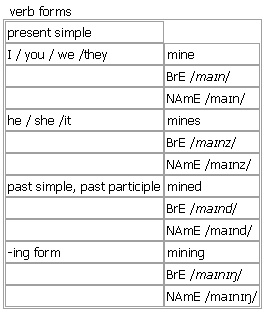|
Từ điển Oxford Advanced Learner 8th
 mine
mine

mine [mine mines mined mining] pronoun, noun, verb BrE [maɪn] NAmE [maɪn]
pronoun (the possessive form of I)
1. of or belonging to the person writing or speaking
• That's mine.
• He's a friend of mine (= one of my friends).
•She wanted one like mine (= like I have).
2. (BrE, informal)my home
•Let's go back to mine after the show.
Word Origin:
pron. Old English mīn Germanic ↑me Dutch mijn German mein n. and v. late Middle English Old French mine miner Celtic Welsh mwyn ‘ore’ ‘mine’
Idiom: ↑mine of information
noun
1. a deep hole or holes under the ground where minerals such as coal, gold, etc. are dug
•a copper/diamond mine
compare ↑pit, ↑quarry
see also ↑mining, ↑coal mine, ↑gold mine
2. a type of bomb that is hidden under the ground or in the sea and that explodes when sb/sth touches it
see also ↑landmine
Word Origin:
pron. Old English mīn Germanic ↑me Dutch mijn German mein n. and v. late Middle English Old French mine miner Celtic Welsh mwyn ‘ore’ ‘mine’
Culture:
coal mining
Coal was very important in the economic development of Britain. It was used as fuel in the factories built during the ↑Industrial Revolution and continued to be important until the 1980s. The main coalfields were in north-east England, the north Midlands and the valleys of south Wales, especially the ↑Rhondda Valley. Towns and villages grew around the collieries or pits (= coal mines) and were dominated by the pithead where the lifting machinery was, and by large black slag heaps (= piles of waste material). Poor conditions and low pay led to a long history of industrial trouble and caused miners to play a leading role in the development of the ↑trade union movement.
In 1913 Britain produced 292 million tons of coal and employed over a million miners. In 1947, when the mines were nationalized (= brought under government control), there were still about 1 000 collieries and 700 000 miners. Increased use of ↑North Sea oil and gas in the 1970s led to a lower demand for coal. Coal gas was replaced by natural gas. By the mid 1980s there were only 160 collieries and 200 000 miners. Fear of further job losses led to the long and violent miners' strike of 1984–5. In the 1990s there were more pit closures. In mining communities throughout Britain thousands of former miners have struggled to find new jobs. Collieries were returned to private ownership in 1994, and most coal now produced in Britain is sold to the electricity-generating industry. In 2003 just over 11 000 people were employed in mining.
Coal mining is important in the US. In 1988 the US produced nearly a fifth of the world’s coal. Most is mined in the ↑Appalachian Mountains. Modern mining techniques used in ↑West Virginia have removed whole mountain tops and destroyed large areas of forest. Coal is used especially in the electricity-generating industry and in the manufacture of steel. In 2002 the US coal mining industry employed about 110 000 workers.
Example Bank:
•At its peak, the mine produced 5 000 tons of coal a day.
•Soldiers laid anti-personnel mines in the fields.
•The troops are slowly clearing the mines.
•flooded mine workings
•poor working conditions in the mines
•soldiers laying anti-personnel mines
•He was killed when his jeep ran over a land mine.
verb
1. transitive, intransitive to dig holes in the ground in order to find and obtain coal, diamonds, etc
•~ sth (for sth) The area has been mined for slate for centuries.
•Uranium is mined from deep underground.
•~ (for sth) They were mining for gold.
2. transitive ~ sth to place ↑mines n. (2) below the surface of an area of land or water; to destroy a vehicle with ↑mines
•The coastal route had been mined.
•The UN convoy was mined on its way to the border.
Verb forms: 
Word Origin:
pron. Old English mīn Germanic ↑me Dutch mijn German mein n. and v. late Middle English Old French mine miner Celtic Welsh mwyn ‘ore’ ‘mine’
|
|
|
|
